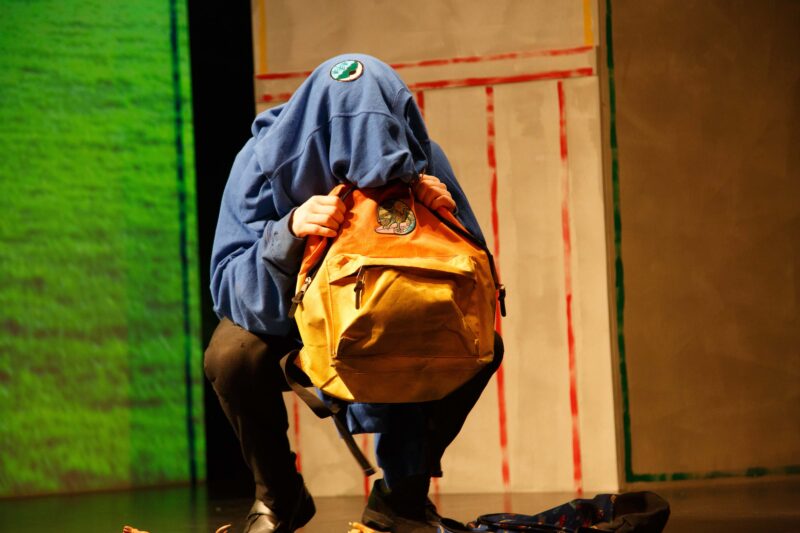


Since the start of lockdown I’ve had conversations with 16 freelancers who have asked for help and advice about how to navigate the pandemic, how to ‘get ready’ when things open up, or how to up-skill because they need to make sure that work keeps coming. Almost all of them are working class and terrified of falling ‘off the edge’.
One of the worst jobs I’ve had to do was call artists and tell them that a tour we were planning for Spring 2021 has had to go on hold – I was calling them to tell them that the prospect of getting paid after a hard year and a tough Christmas this year, that the tour wasn’t going to happen until next Spring 2022. I was Scrooge, but in spring. A friend said to me ‘don’t worry, they’ll be expecting it, everyone is cancelling everything’ – that didn’t make me feel better, if anything it made me feel worse. I didn’t want to be part of that.
We’ve been fortunate to receive funding to give people work, prioritising freelancers we were due to work with, but it still doesn’t erase that horrid feeling of delaying their pencilled income.
A few weeks ago I was invited to speak on a panel at The People’s Assembly Manchester’s event: Making Sense of The Crisis: The Future for Arts and Theatre. The panel were asked to respond to the government’s announcement of £1.57 billion pound grants and loan package for the arts and to share their thoughts, hopes and fears about the future of the arts industry. As a working class performer I’ve spent over a decade fighting for my place in the industry while wrestling with imposter syndrome. I had a lot to say.

The panel included brilliant creatives; Julie Hesmondhalgh – Actor, Writer and Campaigner, Cherylee Houston – Actor and cofounder of DANC,The Disabled Artists Networking Community also creator of Tinsel Girl on Radio Four, Sameena Hussain – Theatre Director and Community Practitioner and Melissa Johns DANC (The Disabled Artists Networking Community) co founder.
Click here to watch Sarah's provocationI feel really fortunate to have a company who are fairly established in Greater Manchester and to have a track record of freelancing for over a decade before this pandemic hit. For those just leaving education, the hill must feel impossible to climb, especially if you’re trans/non binary and/or disabled and/or deaf and/or global majority.
Ross was one of the actors I had to call to postpone work, and we talked about him taking up work shifts as more and more arts work cancelled. Ross asked for some advice for his own arts company and talked about his frustration of having to work a job to to pay the bills when he wanted to focus on building his company. It took me back to 2009 when I was working in a bar, working as a waitress, working at a youth centre, grabbing at adhoc admin work, and supply teaching, balancing my credit card and overdraft all whilst dreaming of setting up an arts company. Every week I felt unsafe and precarious; feeling that the next week could be the week I have to leave the arts because I just can’t cover my bills with all this unstable part time work. I wanted to make my own work but I definitely didn’t know anything about business; people like me, from my estate, we don’t run our own companies, we dance to someone else’s tune.
Ross graduated from The University of Salford in 2018, I graduated from the same University 13 years earlier. 13 years; unlucky for some, and clearly is for us too because as a working class artist who set up a company in the aftermath of a financial crash, speaking to another working class artist who had set one up just prior to a pandemic, 10 years apart, the barriers don’t seem to have shrunk; with it being noted that in 2018 only 12.4% of the workforce in the creative industries being from working-class origins.
The arts sector is in trouble, fractured by the pandemic there’s no doubt about that, but a new world is being built behind closed doors, and we think it’s important artists voices are heard during this rebuild. As someone we’re working with through our touring work and Artist Brew Days, we asked Ross, as a working class artist setting up a new company, to reflect on his experience and hopes.
Sarah Emmott, Co-Creative Director

I got asked recently, what does a working-class person need in a post-pandemic world? To an extent, coronavirus has completely ruined theatre and, subsequently, making it, but the struggles I’m going to face coming back into the theatre world aren’t new to me. My voice, like many others in this industry, is unheard.
This is a letter to the powerful, the people in charge. The people who can make the difference we so desperately need. Now, more than ever, we need your support. It takes small changes for the industry to be a better place, with lasting impact. Our careers, our progression, our foot in the door is often in your hands. We often have to put our ideas to the side because we have to work other jobs to pay the rent in order to survive, whilst we sit back and watch the middle classes thrive. Imagine if casting directors, artistic directors and theatre owners spent just one hour a week looking at new, working-class voices, and when I say working class that means all of us, no matter your race, religion or sexual orientation. Some venues might be doing this already, but imagine if this was happening in all organisations across the industry, what a difference that would make.


It’s infuriating to see that now, during lockdown, you’d think I have ample time to collate ideas and work on future projects more in depth, but I actually have less time due to the fact I need to work another job (unrelated to the arts) in order to pay my rent and put food on the table. I can’t even begin to think about how much more time I’d have to put into my theatre company if I didn’t have to work five/ six days a week in order to just live in Manchester and escape the city where I grew up. Unfortunately, where I grew up, there are not many creative opportunities, especially as an adult. If I had to move back in with my parents, I’d have to give up my job, my passion, what helps me get out of bed in the morning. This is not me saying only employ working-class people. I don’t want to become a statistic, a tick box that makes you feel like you’re helping us out. I don’t want to be given a job just because I’m working-class, but I don’t want to not receive it because I am.
Drama schools/University auditions are key for starting to see what our futures may be like but not only do people like myself get put off by the daunting audition fees alone, which can set you back £50-80 PER AUDITION, but the inevitable living cost of drama school just isn’t feasible. It’s enraging, infuriating, systematic classism at it’s finest. I think we’re so used to it we accept it’s our fate but we’re incredibly angry about the blatant exclusion. There are grants and scholarships that people can get, I am aware, but these are few and far between. If you’re lucky and get in, you’re likely to need to work a job to live (which some drama schools don’t allow); imagine a 8-12 hour day of learning and honing your craft, then going to work whilst others can go home, relax and do further learning. You’re at a huge disadvantage.
I didn’t go to drama school, but did study at a university and after graduating, arguably primed with the most knowledge of this industry and my craft that I’ve ever had, I had to go back to my parents’ house and work so I could save up enough money to move back to Manchester so I could get to auditions. Meanwhile, others could sit and wait for the phone to ring, or perform at the fringe for free, or be available for last minute opportunities without risking losing their income job because they are constantly rearranging their work rota.
If you have more money, you get better education and thus a better job. 67% of British Oscar winners went to private school yet only just 18% of over 16’s goes to private school. From a young age you are not more qualified than anyone else, you may just have the right tools, money and help to then further your education. Meanwhile, it can feel like I must work twice as hard for half the reward.
I think it’s so important to have working-class people in positions of power, having our voice heard, and listened to. I’d love to see more young working-class people aspiring to be actors but how can they aspire to be an actor if none of the actors or characters they see resonate with them? There’s also unconscious bias. If I have a ‘common’ accent, I’m deemed inferior/not as intelligent as someone who has an RP accent*. I am fiercely proud of my northern roots and where I was born does not mean I have lesser ideas than anyone else.
One of my main aims is to get more working-class people to frequent the theatre, to do this, we need to make it affordable and relevant for everyone. Theatre is supposed to represent the people and the masses and it’s well known that working-class actors are underrepresented** and with no ‘bank of mum & dad’, no safety net, no inheritance, no pension, no guarantees, no regular set income, no stability it’s no wonder 4.3 million working-class males in the UK have some kind of mental health issue.


Let’s not beat around the bush, as an actor you are a brand, you are your own business. If I’ve never had any experience of running a business or been taught about it, it’s going to be hard for me to make it in this industry.
As working-class people we don’t have the language, the business technique that the middle-class kids get; I come from a working-class family who would really struggle to teach me about business, and I didn’t go to privileged university or drama school to learn the language, so feel I don’t have the ‘know how’ when speaking to you. It’s intimidating – I have good ideas but can’t articulate them in YOUR language. If this is a necessity, then this is something we should be taught. I don’t know what all the business acronyms are, but my ideas are strong, my passion is on fire and those are the things that are important, not just if I can talk the ‘artsy’ language; the sophistication of your vocabulary shouldn’t need to be a big factor in pitching a good idea.
In order to be in a job doing what I love, I’m an actor but also make my own work and set up Farewell Theatre Company. I think things like tour booking and funding applications should be taught as it is a vital skill that, when graduating, most don’t have the first clue about. I don’t think there is enough support from the ‘big’ theatres for local artists. Money goes into the big productions because that’s how the theatres know they can earn a lot of money but imagine if every theatre did one week in the year each that showcased 6 different local theatre companies on 6 different nights. That’s just one week out of their busy 52 week schedule but it could mean big opportunities for people across the country. It’s about small changes to create a big national impact. I’m not saying there are no opportunities, things like the Greater Manchester Artist Hub are brilliant, but before writing this, I’d never even heard of it. If there are things out there to help and support local talent, why isn’t it reaching all the local talent?
I am asking you, as someone with power, artist to artist, for a change. Let’s take more time to discover new artists, local theatre companies and different forms of art. Let’s create more spaces for working-class creatives to be listened to. Let’s keep finding new people and sit down and talk to artists you’ve never heard of. Let’s have affordable workshops. Let’s have graduate schemes. Let’s have more local funding for new theatre companies. Most importantly, let’s educate and let’s provide more opportunities for the working-class.
– Ross Thompson, Actor
*Articles include: https://inews.co.uk/opinion/comment/british-people-still-judge-how-smart-others-are-by-their-accents-367662 and https://www.bbc.com/future/article/20180307-what-does-your-accent-say-about-you
** “Only 12.4% of the workforce in the creative industries are from working-class origins” – Panic! Social Class, Taste and Inequalities in the Creative Industries, 2018


Born in Carlisle, Ross was enthralled by theatre knowing he wanted to do it as a career from age 14. Ross attended Salford University to study Theatre and Performance Practice and graduated in 2018 with a first class honours degree.
Ross set up Farewell Theatre Company and a year later, they had their first performance of their original play, Boots ‘n’ Braces at the Greater Manchester Fringe. Ross has worked with Up ‘ere Productions on Get Help, music videos for Dr!ftwood and Prose and Art with Heart’s Stan.
Twitter: @Rossi_T_ & @CompanyFarewell
Instagram: @Rossi_T_ & @Farewelltheatrecompany
Facebook: Farewell Theatre Company
We are Art with Heart, and we want to bring together as many people as possible to unlock their creativity and connection to each other. As a registered charity (1205611), donations make it possible to deliver accessible, representative and inclusive projects, to engage more people, employ more freelancers and plan further into the future. Together, we are building Art with Heart, we would love you to join us! CLICK HERE to donate through our Ko-fi campaign.